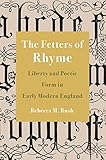The Fetters of Rhyme : Liberty and Poetic Form in Early Modern England / Rebecca M. Rush.
Material type: TextPublisher: Princeton, NJ : Princeton University Press, [2021]Copyright date: ©2021Description: 1 online resource (304 p.) : 3 b/w illus. 1 tableContent type:
TextPublisher: Princeton, NJ : Princeton University Press, [2021]Copyright date: ©2021Description: 1 online resource (304 p.) : 3 b/w illus. 1 tableContent type: - 9780691212555
- 9780691215686
- Couplets, English -- History and criticism
- English language -- Rhyme
- English poetry -- Early modern, 1500-1700 -- History and criticism
- Literature -- Philosophy
- Poetics
- LITERARY CRITICISM / Poetry
- Abraham Cowley
- Amoretti
- David Caplan
- Donald Wesling
- Donnean couplet
- Elizabethan
- English Civil War
- Inns of Court
- Katherine Philips
- Milton and the Burden of Freedom
- Milton and the Poetics of Freedom
- Poetics
- Renaissance
- Rhyme’s Challenge
- Robert Herrick
- Susanne Woods
- The Chances of Rhyme
- Warren Chernaik
- analogy
- bonds of the heart
- history of liberalism
- history of the lyric
- iambic pentameter
- love’s bands
- lyric
- measure
- modern song
- modern verse
- poetic sublimity
- prosody
- rhetorical studies
- rhyme’s chime
- seventeenth-century
- verse culture
- 821/.409 23
- PR535.R48 R87 2021
- online - DeGruyter
| Item type | Current library | Call number | URL | Status | Notes | Barcode | |
|---|---|---|---|---|---|---|---|
 eBook
eBook
|
Biblioteca "Angelicum" Pont. Univ. S.Tommaso d'Aquino Nuvola online | online - DeGruyter (Browse shelf(Opens below)) | Online access | Not for loan (Accesso limitato) | Accesso per gli utenti autorizzati / Access for authorized users | (dgr)9780691215686 |
Frontmatter -- Contents -- Acknowledgments -- Abbreviations -- The Fetters of Rhyme -- Introduction -- Chapter 1 Sweet Be the Bands -- Chapter 2 Licentious Rhymers -- Chapter 3 An Even and Unaltered Gait -- Chapter 4 Rhyme Oft Times Overreaches Reason -- Chapter 5 Milton and the Known Rules of Ancient Liberty -- Notes -- Bibliography -- Index
restricted access online access with authorization star
http://purl.org/coar/access_right/c_16ec
How rhyme became entangled with debates about the nature of liberty in sixteenth- and seventeenth-century English poetryIn his 1668 preface to Paradise Lost, John Milton rejected the use of rhyme, portraying himself as a revolutionary freeing English verse from “the troublesome and modern bondage of Riming.” Despite his claim to be a pioneer, Milton was not initiating a new line of thought—English poets had been debating about rhyme and its connections to liberty, freedom, and constraint since Queen Elizabeth’s reign. The Fetters of Rhyme traces this dynamic history of rhyme from the 1590s through the 1670s. Rebecca Rush uncovers the surprising associations early modern readers attached to rhyming forms like couplets and sonnets, and she shows how reading poetic form from a historical perspective yields fresh insights into verse’s complexities.Rush explores how early modern poets imagined rhyme as a band or fetter, comparing it to the bonds linking individuals to political, social, and religious communities. She considers how Edmund Spenser’s sonnet rhymes stood as emblems of voluntary confinement, how John Donne’s revival of the Chaucerian couplet signaled sexual and political radicalism, and how Ben Jonson’s verse charted a middle way between licentious Elizabethan couplet poets and slavish sonneteers. Rush then looks at why the royalist poets embraced the prerational charms of rhyme, and how Milton spent his career reckoning with rhyme’s allures.Examining a poetic feature that sits between sound and sense, liberty and measure, The Fetters of Rhyme elucidates early modern efforts to negotiate these forces in verse making and reading.
Mode of access: Internet via World Wide Web.
In English.
Description based on online resource; title from PDF title page (publisher's Web site, viewed 25. Jun 2024)


